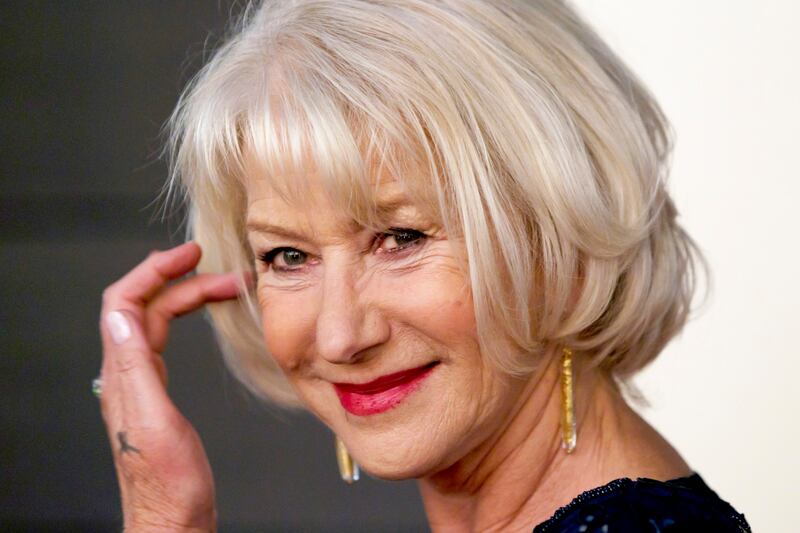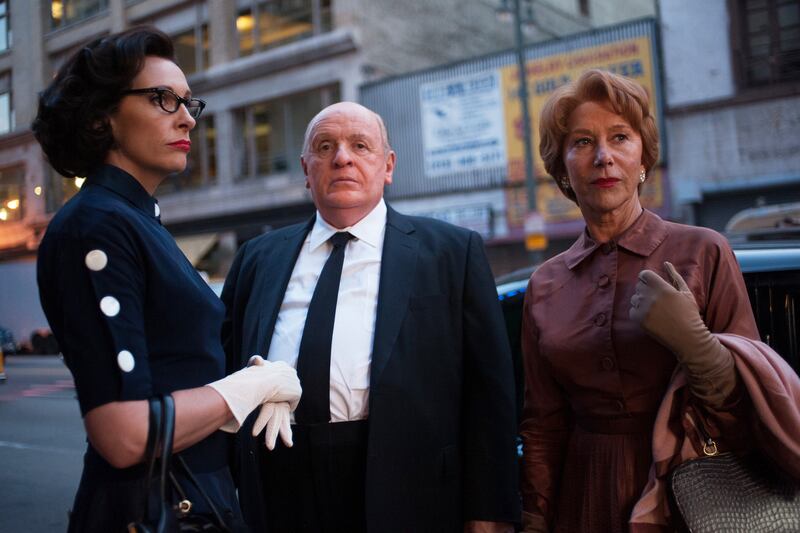“I always felt like a bit of an outsider,” says Helen Mirren.

Clad in a body-hugging blue dress, the veteran actress is a paragon of elegance and sophistication in an industry brimming with inanity. Her no-bullshit candor is refreshing for journalists oft exposed to an endless string of PR-coached actors regurgitating stock answers. And, at 67, she not only looks as fetching as ever, but has managed to flip the proverbial bird to ageist Hollywood—a town notorious for toasting women’s 50thbirthdays with pink slips.
Earlier in her career, however, Mirren wasn’t treated so regally. After causing waves as a lascivious muse to an older painter in 1969’s Age of Consent, she was cruelly objectified by the British press for her looks and sensual onscreen persona. The coup de grâce came in 1975 when, during a TV interview with famed British host Michael Parkinson, she was subjected to a barrage of sexist comments and even told she projected a “sluttish eroticism.”
ADVERTISEMENT
“It’s amazing, isn’t it?” she says. “You just had to put up with it. It was tough when I was younger; it was like an albatross on my back but I just found a way to navigate it. I thought, ‘They can think what they like and I’ll show them through the work that I do,’ which is what I did.”
Mirren has since received four Oscar nominations—and one Best Actress win, for 2006’s The Queen. If awards pundits are correct, she is well on her way to a fifth nod for her dazzling performance in Hitchcock. Directed by Sacha Gervasi (Anvil! The Story of Anvil), the film offers a behind-the-scenes glimpse into the making of the 1960 horror-classic Psycho, which Hitchcock (Anthony Hopkins) self-financed by mortgaging his house, and the portly filmmaker’s obsession with his alluring leading ladies.
The most compelling storyline, however, concerns Hitchcock’s complicated relationship with his wife, Alma Reville, played by Mirren. Reville was an assistant director, screenwriter, and editor, who hired “Hitch”—as she calls him—to his first studio job. She wasn’t just his wife but doubled as a collaborator, helping her tortured, undertaker-attired husband create his silver-screen masterpieces.
Since Mirren has been married to director Taylor Hackford (Ray) since 1997, she related to being partnered with a man imbued with “obsessiveness, tenaciousness, and complete commitment,” but also acknowledged that she doesn’t help in the editing or writing of her spouse’s films.
Mirren also had a face-to-face with Hitchcock in 1970, but did not take a shine to the filmmaker.

“I was a very young actress in London and I met him to audition for a role in Frenzy,” she recalls. “He didn’t cast me. He didn’t like me at all and I actually didn’t like him very much either. He was rather intimidating. I just remember this massive man sitting behind a desk. I didn’t want to do the movie; I was a combination of arrogant and ignorant about Hitchcock in general. He wasn’t my kind of director at the time.”
She’s since grown to appreciate Notorious and in particular, Vertigo, which she calls “so radical.” And, while there are dueling jealousies on display in Hitchcock between filmmaker and wife—she grows wary of his lusting over the “Hitchcock Blondes,” while he gets jealous of her relationship with randy screenwriter Whitfield Cook (Danny Huston)—Mirren says she and Hackford haven’t experienced similar hardships.
“I experienced personal humiliation but it was nothing to do with Taylor,” she says. “It was fairly hard for me when I first hooked up with Tay and coming to Los Angeles because nobody knew me here. I’d meet casting directors and go to parties with Taylor and I was completely Z-list. It was kind of galling and humiliating for me to be so unimportant, but he was always so generous to me and never questioned my need or desire to work.”
Despite once admitting to GQ that she “loved coke” and did “a little bit at parties” back in the day, Mirren says she never got swept up in the posh 1960s and 1970s party scene like many of her acting contemporaries.
“When I did O Lucky Man! in the early ’70s, I was asked to go to Cannes because it showed there,” she says. “I was doing experimental theater at the time in Paris with no money and sleeping on someone’s floor; it was a very bohemian, Parisian lifestyle. And then I’m suddenly on the red carpet in Cannes. They had to buy me clothes because I didn’t have anything to wear! The whole party scene was always a weird thing that I didn’t particularly want to be a part of because I was so busy in the theater.”
Mirren was never a very posh gal to begin with. Her father was a Russian immigrant who drove a taxicab to support the family, while her mother was the 13th of 14 children born to a butcher in East London. It’s quite ironic, then, that she achieved the pinnacle of her profession portraying Queen Elizabeth II in 2006’s The Queen—a role she will be reprising on the London stage next February in The Audience. Written by Peter Morgan (The Queen) and directed by Stephen Daldry (The Reader), the play will recreate different confidential meetings between British prime ministers and the queen held at Buckingham Palace over the course of the monarh’s 60-year tenure.
“I’d say if it was anyone’s fantasy, it was my mother’s,” she says. “She really chafed under the British class system because we were so-called ‘working class people.’ I remember her telling me a story about how when she was a young secretary in London, she went into a department store and the doorman said, ‘Excuse me madam, do you have an account here?’ She was so angry about that and resentful of the class system in Britain, so I think it would have been very gratifying for her to see me as queen.”





